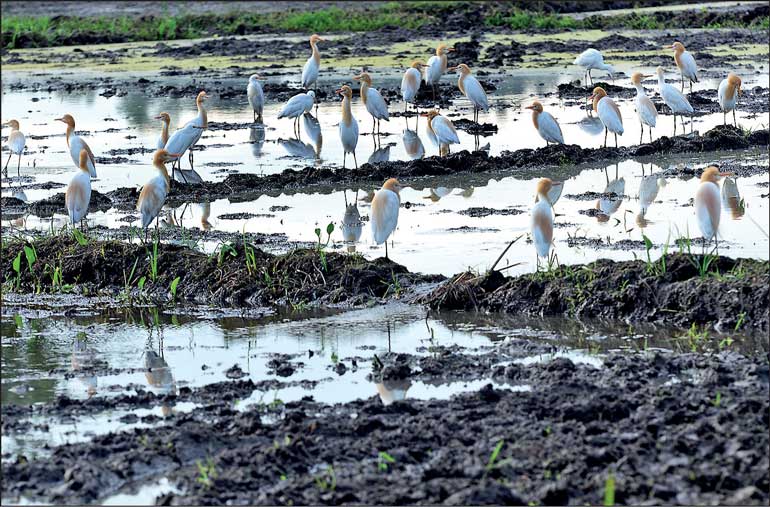Friday Feb 20, 2026
Friday Feb 20, 2026
Wednesday, 27 October 2021 00:00 - - {{hitsCtrl.values.hits}}

At a time when the Maha season should see farmers working in the fields, many are staying back because there is a critical shortage of chemical fertiliser and what little that is available is obviously too pricy to purchase – Pic by Shehan Gunasekara
|
 President Gotabaya Rajapaksa, his Viyathmaga and Government through an amateurish experiment to transform the country’s agricultural sector from using chemical fertiliser to organic fertiliser may have inadvertently or out of ignorance created more problems than they intended to solve, and set the scene for a revolt by the masses when rice shortage hits the market after the Maha season. It is not the objective that is causing the crisis but the methodology of the experiment. Will GR again cry mea culpa?
President Gotabaya Rajapaksa, his Viyathmaga and Government through an amateurish experiment to transform the country’s agricultural sector from using chemical fertiliser to organic fertiliser may have inadvertently or out of ignorance created more problems than they intended to solve, and set the scene for a revolt by the masses when rice shortage hits the market after the Maha season. It is not the objective that is causing the crisis but the methodology of the experiment. Will GR again cry mea culpa?
In the battle between the green revolution sponsored by agrochemical industries and supported by US and the West, and structural reforms in agriculture advocated by former USSR and its allies, the capitalist West won the battle hands down, and food production and agriculture had a chemical bath since 1960s. Sri Lanka was no exception to this baptism.
The introduction of IR8, a seed paddy that came out of the Rice Research Institute in Manila and marketed in Sri Lanka, helped increasing rice output faster than the contribution made by Phillip Gunawardena’s Paddy Lands Bill. However, the downside of this revolution was the damage it caused to the environment through generous use of chemical inputs. IR8 needed not only chemical fertiliser but also a set of weedicides and insecticides, also chemically produced, to yield its full potential.
Although world hunger has not been driven out yet, more than 60 years of chemicals buried inside the arable land has caused colossal damage to the natural fertility of soil and the environment. The world is now waking up to this calamitous reality. Worldwide protests demanding governments to take speedy and radical measures to save the planet and future generations of humanity from global warming are outcomes of this realisation. No doubt, agrochemical industries will put up tough resistance to protect their business, but like the cigarette industry, theirs is a losing battle. The call for regenerative farming is overtaking the voice of green revolution.
Given this background, President GR’s idea of switching to organic agriculture deserves support. But the problem is, a transformation from green revolution to regenerative farming is not segues but requires planned preparation requiring investment in local research and experiment before presenting the findings to farmers for adoption.
Instead, the initial blanket ban on the import of chemical fertilisers followed by a decision to import organic fertiliser from China, which had to be withdrawn in haste, because of harmful bacterial content found in that product, and switching that import to Indian nano-nitrogen fertiliser, which has now been found not organic by the Federation of University Teachers Association, are symptomatic of a President who, like Stalin, believes that his order is enough to produce the desired result. One should not be surprised if GR in a mood of frustration and haste decides to send jackboots to force farmers cultivate their fields even without any fertiliser.
At a time when the Maha season should see farmers working in the fields, many are staying back because there is a critical shortage of chemical fertiliser and what little that is available is obviously too pricy to purchase. That a shortage of fertiliser is also going to affect commercial crop production is another story. However, the seasonal paddy harvest would most probably fall short of the norm and rice imports need to be continued to supplement local stock. This would inevitably widen the country’s trade deficit and cause further depletion of the country’s meagre foreign reserves. Is more foreign debt the answer to the failed experiment, Mr. President?
Once again, GR’s organic farming experiment demonstrates the regime’s unwillingness or disregard local knowledge and expertise. Recently, the President has warned farmers not to fall prey to political propaganda against his experiment.
Farmers are by nature a conservative community and they would not adopt a new technique or crop unless they are certain of its success. Unlike paddy cultivators, vegetable and fruit growers are already using a mixture of organic and chemical fertilisers and are happy with that technique. If the same technique could be replicated in paddy cultivation and in State-owned farms initially, its success could have a powerful demonstration effect on the farming community. Farmers would be automatically induced to adopt regenerative farming without much incentives. This is why local research and experiment are essential before advocating changes in agriculture.
Instead, an authoritarian GR seems to have no inclination for consultation with independent local experts before putting his ideas into practice. It was the same problem that messed up a more effective approach to control the pandemic earlier. The total economic cost of this doomed experiment is going to be wider.
Already, Cabraal’s six-month Road Map for economic recovery and his growth expectations have raised doubts among international credit rating agencies, notably from Fitch. This means further borrowing would become costly, debt burden heavier, servicing difficult and default a strong possibility. One wonders why the CBSL Governor is so reluctant to approach the IMF which is there to help countries facing in balance of payments difficulties. The longer Nivard Cabraal delays approaching the IMF, the greater would be the pain for the country and its people when he is compelled to go eventually. A stitch in time saves nine.
(The writer is attached to the School of Business & Governance, Murdoch University, Western Australia.)